Vitamin B12 offers a variety of benefits for your mood, skin and hair, and heart health.
Learn more about this exciting vitamin.
There are few vitamins that have as great an impact on health, quality of life and longevity as vitamin B12. The human body needs it to make red blood cells, nerves, DNA and more. The average adult should get 4 micrograms per day. Like most vitamins, however, B12 cannot be produced by the body itself. Instead, it must be supplied from our food.
And therein lies the problem: Some people do not absorb enough vitamin B12 to meet their needs – others cannot absorb enough of it, no matter how much is fed to the body.As a result, vitamin B12 deficiency is relatively common – and not only vegans suffer from it. Everything you need to know about this important vitamin can be found here.
What is vitamin B12?
Like all B vitamins, vitamin B12 is water-soluble. This means that it can dissolve in water and travel through the bloodstream. However, unlike all other B vitamins, the human body can store this vitamin for up to four years in the liver and other body tissues, such as the muscles. Excess B12 is not absorbed by the body, but is excreted in the urine.
Vitamin B12 is the largest and structurally most complex vitamin in existence. It does not occur naturally in nature in either plants or animals, but is produced exclusively by microorganisms – i.e. bacteria. These live mainly in the intestines of animals and thus enter our food chain.
Vitamin B12 is also the only vitamin that contains a vital trace element in the middle of its molecule, namely cobalt. This trace element is actually responsible for the many wonderful benefits attributed to vitamin B12. This is where its second name “cobalamin” comes from.
There are various cobalamins that provide benefits to the human organism as B12. I present these below. But first you should learn what the body needs this vitamin for in the first place.
What does the body actually need vitamin B12 for?
Cobalamin is involved in the production of red blood cells, the maintenance of a healthy nervous system and the conversion of food into energy. It also helps regulate the immune system and mood, and control blood levels of the amino acid homocysteine, elevated levels of which are associated with heart disease.
Browse through the many functions of this fascinating vitamin before learning which foods contain particularly high amounts of it.
Vitamin B12 gives more energy
Taking cobalamin can help reduce fatigue and increase energy levels. But note that its effect on energy has only been demonstrated in people who are deficient or deficient in this essential vitamin. If you’re well supplied with B12 through diet, taking a supplement won’t give you the extra energy boost you’re looking for.
Vitamin B12 supports cell growth
All cells in the body need vitamin B12 to function normally. One of its main functions is to be a cofactor in the production of DNA for the growth of new cells. If B12 is missing, new DNA cannot be produced. And no new DNA means no new cells, including blood cells. This is especially important, for example, if you are pregnant or breastfeeding. Poor cobalamin status, by the way, has been linked to an increased risk of breast cancer in some studies. However, it is worth examining whether dietary supplementation with vitamin B12 can help reduce the incidence of breast cancer. (1) (2)
Vitamin B12 can improve mood and mental health
We all get a little depressed sometimes, but if it’s hard to get through the fog, you may need more vitamin B12. Research shows that low B12 levels increase the risk for depression. Cobalamin is involved in the formation of a protective sheath around nerves called the myelin sheath.
Through its role in the production of neurotransmitters in the body (these are the so-called “happiness hormones” such as serotonin and dopamine), it influences our mood, psyche and perception. Supplementing with B12 may therefore improve symptoms of depression and other mood disorders such as anxiety, especially in people who are B12 deficient or have low B12 levels. (3)
Vitamin B12 can improve cognitive performance.
Increasing B12 intake may also protect neurological health. Studies show that low levels of B12 can damage cognitive health by accelerating neuron loss and negatively affecting brain function. In fact, low B12 levels can lead to poor cognition. So if you’re undersupplied, taking a B12 supplement can help improve your memory and other cognitive functions. (4)
Vitamin B12 supports the healthy development of the fetus
If you are pregnant (or trying to get pregnant), special attention should be paid to B12 levels in addition to folate. The rapid growth and development of the fetus during pregnancy dramatically increases the need for vitamin B12. Vitamin B12, along with folate, is critical for the development of the fetal central nervous system and deficiency can lead to neural tube defects if necessary.
The defects result from the failure of the embryonic neural tube to close, a process that occurs between days 21 and 28 after conception – a time when many women are unaware of their pregnancy. However, more research is needed to explore and substantiate the relationships in more detail.(5)
If you’re not getting enough B12 from food, you can also take a good supplement. But as always, this should be discussed with a doctor beforehand to make sure the right dose is taken and you’re getting what you and your baby need to be healthy.
Vitamin B12 helps detoxification
All important processes of the body, which are necessary for maintaining health or healing, are controlled by methyl groups. If there are not enough methyl groups, the person gets out of balance. Vitamin B12 is an important component of methylation that takes place in the liver to, for example, break down cellular waste products and excess hormones, turn enzymatic reactions on and off, deactivate inflammatory processes, activate serotonin (the feel-good hormone) and melatonin (the sleep hormone), turn stress responses on and off, and bind and excrete fat-soluble toxins.
For example, cobalamin neutralizes the amino acid homocysteine, which is harmful to the body in excess and, in high doses, is linked to heart disease, stroke and Alzheimer’s disease. The toxin cyanide as well as radicals such as nitric oxide and peroxynitrite are also rendered harmless by vitamin B12. Vitamin B12 thus contributes to your health in the long term, apart from having a positive effect on fatigue, migraines, mood swings and inflammation. (6)
How much vitamin B12 do I need daily?
The German Nutrition Society (DGE) and the European Food Safety Authority (EFSA) say adults need 4 micrograms (µg) per day. However, this requirement is an estimate and may be much higher due to individual circumstances. The requirement for pregnant women is estimated by both authorities to be 4.5 µg, and that for lactating women to be 5-5.5 µg. (7) (8)
However, according to the National Nutrition Survey (NVS II) of the German government, the average intake of vitamin B12 in women is only 3.8 μg per day, with younger women showing even worse values. Risk groups for intakes below the reference values for vitamin B12 intake are, in addition to vegans and vegetarians, people over 60 years of age.
Although intakes below the reference value do not equate to deficiency, they do increase the likelihood of undersupply.(9) Vitamin B12 supplements are recommended for vegans, vegetarians, and pregnant and lactating women. Read on to find out why.
Where is vitamin B12 found?
Cobalamin is formed exclusively by microorganisms and is found in appreciable quantities only in animal foods, e.g. dairy products, eggs, fish and meat. So if you’re not a vegetarian or vegan, you may be able to get enough vitamin B12 through your diet.
Small amounts of vitamin B12 are found on plant foods, such as unwashed herbs or leaves growing in the wild at low altitudes. However, these amounts are not sufficient to ensure the supply of vitamin B12, even when consumed frequently.
Nori and dulse seaweed have been the only viable plant sources of B12 for strict vegans, but you had to eat a large amount of it, which can cause problems because of the high iodine content.
Other algae such as spirulina, AFA algae and seaweed unfortunately only contain so-called pseudo-B12 or also B12 analogues, which do not function in the human body and cause more harm than good. This is because B12 analogs block the absorption of true B12, actually increasing the body’s need for the nutrient.
As a vegetarian or vegan, it is therefore not particularly easy to get an optimal supply of vitamin B12 from food.
Many of the microorganisms in our intestines can also produce vitamin B12. However, the site of production in the intestine is only after the main absorption point in the ileum of the small intestine – so unfortunately the body cannot access this self-produced vitamin. For more on how B12 is absorbed into the body, see below.
What are the possible causes of vitamin B12 deficiency?
The causes of a vitamin B12 deficiency are the lack of intake of the vitamin from food and the lack of absorption of the vitamin from food, for example due to absorption disorders.
The reason for a deficient intake is a vegan or predominantly vegan lifestyle and/or an increased requirement due to life circumstances (e.g. a lot of stress).
You can learn how B vitamins can support you in stressful times in the article “Why B vitamins help with stress”.
The main causes of B12 deficiency due to absorption disorders include aging, disease, medications, surgery, and gene variations, which I discuss in more detail below. But for this you should first understand how vitamin B12 enters the body, because this is of great importance for this.
How and where is vitamin B12 absorbed by the body?
In foods, cobalamin is always bound to proteins, i.e. egg whites. When the natural protein-B12 complex reaches the stomach, the stomach secretes acids and enzymes that release the B12 from the bound protein. If the body produces too little gastric acid, a disorder can already occur here.
Then another protein, called R-protein, binds to the free vitamin B12 and transports it through the stomach into the small intestine. R protein is found in many fluids of the human body, including saliva and gastric secretions.
Meanwhile, the stomach cells also produce a protein called intrinsic factor (IF). This migrates to the small intestine, as does the B12 bound to the R-protein.
In the small intestine, the B12 is released from the R-protein by enzymes of the pancreas. The released B12 binds here to the intrinsic factor, if present.
The intrinsic factor protects the B12 from destruction by bacteria and digestive enzymes and then safely transports the B12 to the final section of the small intestine, the ileum, where specific receptors take up the B12 bound to the intrinsic factor.
What happens when the B12 uptake mechanism is disturbed?
If the uptake mechanism is disturbed, for example because no intrinsic factor (IF) can be formed, the motto “only a lot helps a lot” applies. High-dose vitamin B12 preparations can bypass the pathway via the transport protein IF.
If sufficient vitamin B12 enters the digestive tract, the vitamin can migrate passively, i.e. all by itself, through the intestinal cells into the blood. Via passive diffusion, sufficient vitamin B12 can thus be made available to the body despite intrinsic factor deficiency.
But it’s the dose that counts. Only 1 to 3 percent of the supplied B12 dose can be absorbed in the small intestine via passive diffusion. Thus, if one takes, for example, 250 µg of vitamin B12 in the form of a supplement, a dose of approximately 2.5-7.5 µg can be supplied via passive diffusion in the intestine.
Since the body only absorbs what it needs, the daily requirement can be covered by this if necessary, even in the case of an absorption disorder.
What are the most common uptake disorders for B12?
You have more than a few drinks a day (on average).
Frequent alcohol consumption irritates the stomach lining and contributes to low stomach acid production, resulting in decreased vitamin B12 absorption. This is because B12 is absorbed in the ileum of the small intestine but stored in the liver, therefore impaired liver function contributes to the depletion of B12 stores.
You are over 50 years old
With increasing age, vitamin B12 deficiencies occur much more frequently than in young people. Studies have shown that about 30 percent of people over the age of 65 develop chronic gastritis, in which the organism attacks the body’s own cells that also produce intrinsic factor through a misdirected defense reaction.
As a result, both the absorption and reabsorption of B12 are disturbed, resulting in an inadequate supply in the long term. The uptake of B12 can then only occur via so-called passive diffusion, for which high doses of >100µg B12 are required. (10)
You have a genetic mutation, e.g. MTHFR
Almost a quarter of the population has a gene mutation that impairs the interaction of folate and vitamin B12: The so-called MTHFR mutation. These people are particularly dependent on taking in sufficient vitamin B12. Taking a B12 supplement is absolutely necessary here. (11)
You have a gastrointestinal disease
Vitamin B12 is normally absorbed in the terminal ileum. If the mucosa in this area is inflamed, e.g. due to Crohn’s disease or celiac disease, no vitamin B12 is absorbed. The uptake of B12 can then also only occur via so-called passive diffusion, for which high doses of >100µg B12 are required. (12)
You had a gastric or intestinal resection
If the part of the stomach or intestine that is important for the formation of the transport protein or the absorption of B12 has been removed in the course of an operation, the vitamin B12 can no longer be sufficiently absorbed from the food.The absorption of B12 can then also only take place here via the so-called passive diffusion, for which high doses of >100µg B12 are required.
You take medication regularly
Prescription medications for heartburn, for example, suppress stomach acid production, which is essential for B12 absorption. If these are taken regularly, a B12 deficiency can develop. The diabetes mellitus drug metformin can also interfere with B12 absorption from food, making supplementation with this vitamin necessary. (13)
What are the symptoms of B12 deficiency?
A deficiency of B12 or cobalamin leads to certain metabolic reactions no longer being possible or being derailed. Unfortunately, however, the symptoms of vitamin B12 deficiency can take years to appear. If you consume 1 µg too little vitamin B12 every day, it can take 5 to 10 years for the deficiency to show up.
If vitamin B12 is suddenly no longer absorbed at all (e.g. after an intestinal resection), it still takes about 3 to 4 years for the B12 stores in the body to be exhausted.
Cobalamin deficiency can show up in a number of ways, making it difficult to diagnose. Many symptoms resemble folate deficiency, which often leads to confusion.
Many symptoms are based on the fact that without B12, the body is unable to produce enough red blood cells to effectively carry oxygen throughout the body. Since B12 also plays an important role in the production of myelin, which protects the nerves, a deficiency inevitably leads to nerve damage and its typical symptoms. If B12 is lacking, homocysteine, a harmful amino acid, accumulates in the body. These three aspects can cause you to
- you feel tired and weak
- suddenly you are very pale around the nose
- suffer from shortness of breath and dizziness
- have numbness or tingling hands and feet
- suddenly have balance problems
- Forgetfulness, confusion occur more and more often
- a sad/sad mood prevails (14)
- Suddenly appear hyperpigmentation of the skin, vitiligo or hair loss (15)
However, all of these signs are not specific to vitamin B12 deficiency alone, so you should always have a check-up with your doctor. This is because if a B12 deficiency is left untreated, it can have serious effects on the body, leading to irreversible nerve damage in the long term.
Vitamin B12 infusions or a high-dose oral cobalamin as a daily supplement are common solutions to address a deficiency.
Which B12 form is best for the body?
In the body, cobalamin is used exclusively in two forms, either methylcobalamin or adenosylcobalamin, the two coenzyme forms.
However, there are a total of four cobalamins that are important for the human organism. All forms appear to be absorbed into the bloodstream with similar efficiency, but differ in overall bioavailability.
Cyanocobalamin
The synthetic form of B12 (CNCbl) and we used in most conventional supplements because it is very cheap to produce. In this form, the cobalamin is bound to cyanide. Yes, that’s right, that’s the poison. However, the amounts we ingest through cyanocobalamin are said to be so small that it has no negative effects on the body.
Researchers nevertheless have concerns about possible cyanide accumulation in human tissues after long-term supplementation. It is also a fact that the body is less able to store this synthetic B12 in the tissues than the other, natural forms. Thus, cyanocobalamin appears to be an inferior choice despite lower cost. (16)
The natural forms of vitamin B12 are called methylcobalamin (MeCbl), adenosylcobalamin (AdCbl) and hydroxycobalamin (OHCbl). These three forms are contained, for example, in our Green Energy plant-based vitamin B12. They differ in form and function:
Methylcobalamin
A natural, active coenzyme form of vitamin B12. What is a coenzyme? A coenzyme is an organic molecule that can bind to an enzyme and help it do its job. Methylcobalamin is needed as a coenzyme in the conversion of harmful homocysteine into good methionine and for the reactivation of folate. It can thereby protect the blood, nerves, heart and DNA. In the human body, it is found in cells and the central nervous system.
Adenosylcobalamin
The second bioactive coenzyme form of vitamin B12 in our body. It is involved in energy production in the power plants of the cells, the mitochondria, and is important for DNA synthesis, on which the formation of red blood cells also depends. In the central nervous system, adenosylcobalamin supports the development of the myelin sheaths that surround and protect the nerve tracts.
Hydroxycobalamin
The third natural form of vitamin B12. It has the best depot effect of all B12 forms. Almost half of the total vitamin B12 in our blood is hydroxocobalamin. In the body, it is converted into the two bioactive coenzyme forms of vitamin B12, methylcobalamin and adenosylcobalamin. Hydroxycobalamin has the advantage that it circulates in the blood for a very long time and detoxifies the blood from cyanide (a small amount of cyanide is contained in cigarette smoke, for example).
Thus, to keep their chronic cyanide exposure low, smokers should turn to vitamin B12 supplements containing hydroxycobalamin. (17)
Hydroxocobalamin also detoxifies the body from nitric oxide, a harmful free radical. Too much nitric oxide can cause headaches, which are caused by dilation of the brain’s blood vessels. (18) Hydroxicobalamin also has the best storage effect of all vitamin B12 forms.
In addition to the vitamin-active compounds, there are so-called B12 analogues, which unfortunately have no effect in the body. They can even block the transport systems for B12 in the body, preventing the absorption of true B12.
What should you look for in a B12 supplement?
Always make sure that the vitamin B12 product contains all three natural forms of vitamin B12, i.e., methylcobalamin, adenosylcobalamin, and hydroxycobalamin. The first two are the most bioactive forms of vitamin B12, but hydroxycobalamin is stored in the body the longest. These three forms have been shown to be best absorbed by the body. (19) You’ll find this optimal triad in our Green Energy plant-based vitamin B12, for example.
Avoid any B12 supplementation with cyanocobalamin. This is synthetic and is not easily utilized by the body. In addition, as the name suggests, it contains cyanide, which is a poison. Although this is not dangerous for the body in such small quantities, it is logically not optimal for the body, because it must somehow dispose of it again.
Basic rule: If the ingredients list on the package only says “vitamin B12”, it is definitely not natural. This is because the list of ingredients must always state the natural source material from which the vitamin was obtained.
You can also recognize many nature-identical, but still synthetically produced B12 forms by the fact that they contain only “methylcobalamin” or similar. This is a clear sign that genetically modified microorganisms have produced the B12 in the laboratory. By the way, the manufacturers do not have to indicate these genetically modified microorganisms on the package and like to call their methylcobalamin “natural” because of the fermentation process. So watch out!
With a truly natural product such as Ogaenics’ Green Energy Plant-based Vitamin B12, you will only find the natural source of our B12, the shiitake mushroom, in the ingredients list. That is the big difference.
Is it possible to overdose on vitamin B12?
No, you cannot overdose on vitamin B12. This vitamin has been shown to be safe even with massive injected doses or oral megadoses. It contains cobalt, but the amount is so small that you would have to eat a handful of pure B12 and not much else to even approach cobalt toxicity. When you take excess B12, your body simply doesn’t absorb it – it just excretes it.
Do vegans need a complete B complex or is B12 alone sufficient?
Generally, B12 alone is sufficient, as most plant foods contain many of the other B vitamins in sufficient amounts (only vitamin B6 supply can sometimes be an additional problem). Our B-Happy Vitamin B Complex contains vitamin B12 and all other important B vitamins. So you can combine to your heart’s content, if necessary. And if not, then not.
These products contain vitamin B12
-
Mr Do-It-All 18+
Organic Multivitamin Complex Premium for men between 18 and 44, All-In-One79,90 €2.069,95 € / kg
-
Bestseller
Mrs Do-It-All 18+
Organic Multivitamin Complex Premium for women of fertile age, All-In-One!79,90 €2.302,59 € / kg


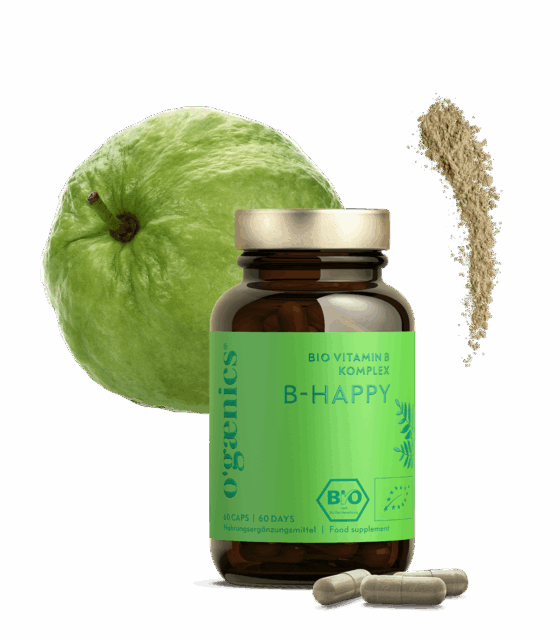

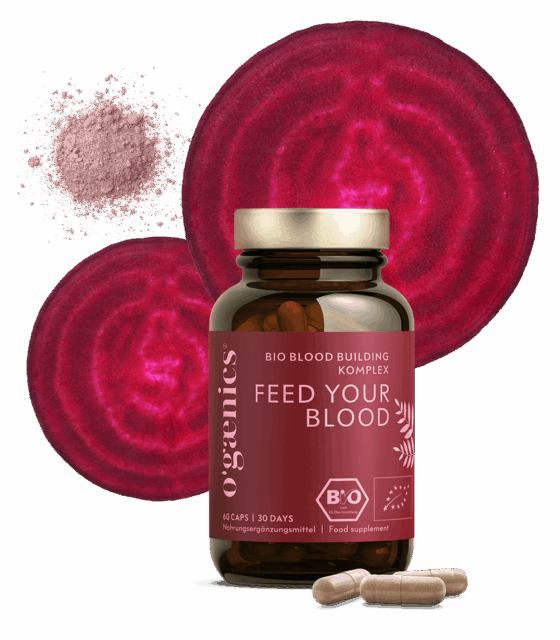

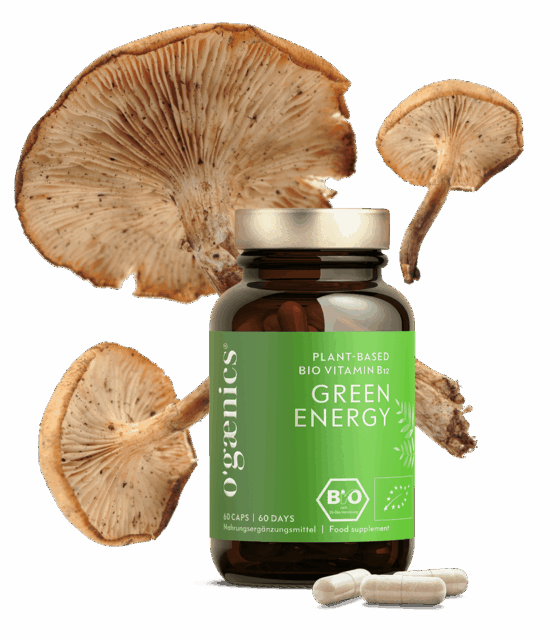

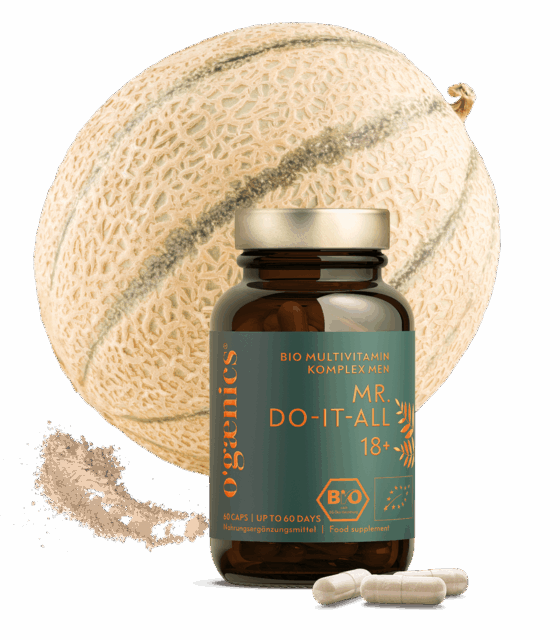
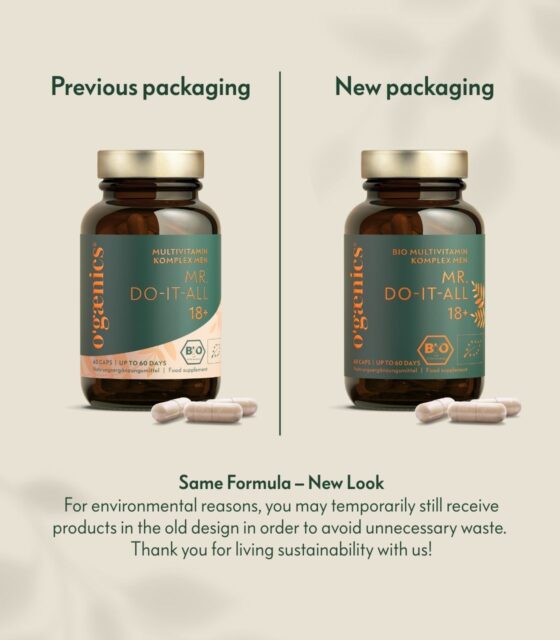
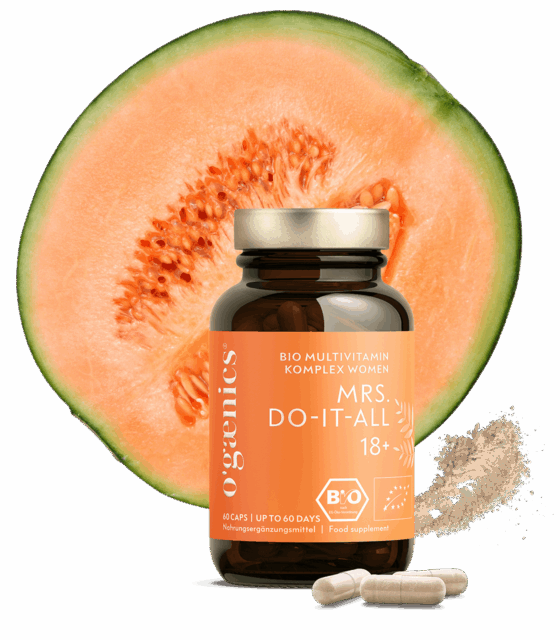
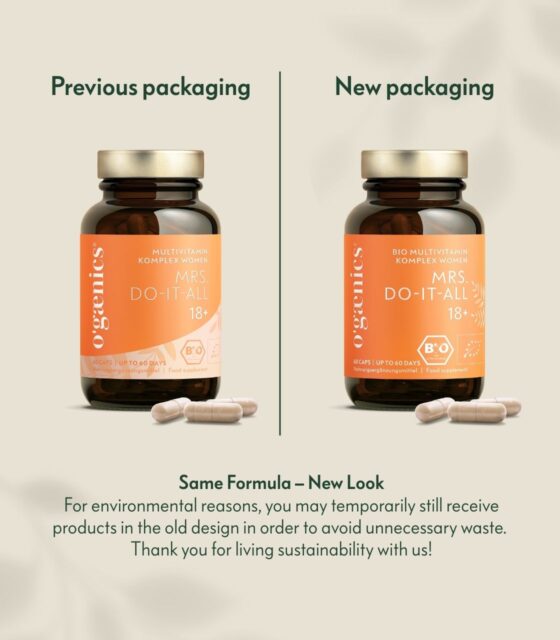



 No products in the cart.
No products in the cart.